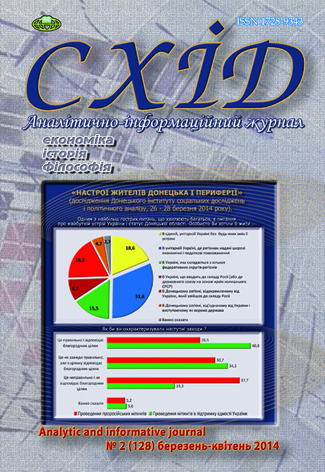Philosophical-educational research methodology of network management of education paradigm
DOI:
https://doi.org/10.21847/1728-9343.2014.2(128).24672Keywords:
network management, network education, philosophy of science, methodologyAbstract
Defining features of the research methodology of network management of education paradigm is the main subject of the article. First of all, we are talking about the need to adapt existing methodologies such as synergistic, systems analysis, activity approach, philosophical hermeneutic methodology. Their use requires consideration of social and cultural characteristics of network-information society and its education sector. The main reason for adaptation of methodologies is consideration of educational networking features, including horizontal interaction between actors in the educational process of combining resources for joint problem solving. Methodologies should also be put in the context of socio-cultural interaction between the content of modern and postmodern management practices to identify the peculiarities of the latter. Adapted methodologies make it possible to explore network management paradigm as polyarchical alternative of directive-administrative management of education.
Downloads
References
Давыдова Н. Н. Управление развитием образовательных учреждений на основе сетевого подхода / Н. Н. Давыдова, В. А. Федоров // Педагогический журнал Башкортостана. - 2012. - № 4. - С. 15-23.
Дорожкин Е. М. Развитие образовательных учреждений в ходе сетевого взаимодействия / Е. М. Дорожкин, Н. Н. Давыдова // Высшее образование в России. - 2013. - № 11. - С. 11-17.
Каракозов С. Д. Сетевая организация образования: тенденции и перспективы / С. Д. Каракозов, К. Г. Митрофанов // Мир науки, культуры, образования. - 2011. - № 4. - С. 180-182.
Петров Н. И. Управленческие стратегии в ситуации постлиберализации культуры / Н. И. Петров // Вестник Саратовского государственного социально-экономического университета. - 2012. - № 1 (40). - С. 194-197.
Чумаков А. С. Управление информационно-образовательными комплексами в сфере образования / А. С. Чумаков // Современные проблемы науки и образования. - 2013. - № 6. - С. 411-417.
Шевчук О. Інформаційне суспільство: бути чи не бути / О. Шевчук, О. Голобуцький. - К. : Атлант UMS, 2001. - 104 с.
Barabasi A.-L. LINKED: The New Science of Networks // A.-L. Barabasi. - Cambridge : Perseus Publishing, 2002. - 186 р.
Castels M. The Rise of the Network Society (The Information Age: Economy, Society and Culture. Vol. I) / M. Castels. - Cambridge, MA ; Oxford, UK : Blackwell, 1996. - 348 р.
REFERENCES
Davydova N. N., Fedorov V. A. (2012), Managing the development of educational institutions on the basis of a network approach, Journal of Education of Bashkortostan, № 4, рр. 15-23 (rus).
Dorozhkin Ye. M., Davydova N. N. (2013), Development of educational institutions in the networking, Higher Education in Russia, № 11, рр. 11-17 (rus).
Karakozov S. D., Mitrofanov K. G. (2011), Network organization of education: trends and prospects, The world of science, culture and education, № 4, рp. 180-182 (rus).
Petrov N. I. (2012), Management strategies in a situation of culture post liberalization, Bulletin of the Saratov State Socio-Economic University, № 1 (40), рр. 194-197 (rus).
Chumakov A. S. (2013), Management of Information-еducational сomplex in education sphere, Modern problems of science and education, № 6, рр. 411-417 (rus).
Shevchuk O., Holobutsky O. (2001), Information Society: to be or not to be, Atlas UMS, Kyiv, 104 p. (ukr).
Barabasi A.-L. (2002), LINKED: The New Science of Networks, Perseus Publishing, Cambridge, Massachusets, 186 р. (engl).
Castels M. (1996), The Rise of the Network Society (The Information Age: Economy, Society and Culture. Vol. I), Blackwell Publishing, Cambridge, MA; Oxford, UK, 348 р. (engl).
Downloads
Published
How to Cite
Issue
Section
License
Copyright (c) 2014 Olga Kolesnik

This work is licensed under a Creative Commons Attribution-NonCommercial-NoDerivatives 4.0 International License.
1. Authors bear responsibility for the accuracy of facts, quotations, numbers and names used.
2. Manuscripts are not sent back.
3. The publisher does not always agree with the authors' opinion.
4. The authors reserve the right to authorship of the work and pass the first publication right of this work to the journal under the terms of a Creative Commons Attribution-NonCommercial-NoDerivatives 4.0 International License. This license allows others to distribute (copy) the published work for non-commercial purposes, provided there is mandatory attribution to its authors and a link to the first publication in our journal.
5. The authors have the right to conclude separate supplement agreements that relate to non-exclusive work distribution in the form in which it has been published by the journal (for example, to upload the work to the online storage of the journal or publish it as part of a monograph), provided that the reference to the first publication of the work in this journal is included.

